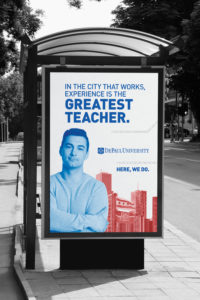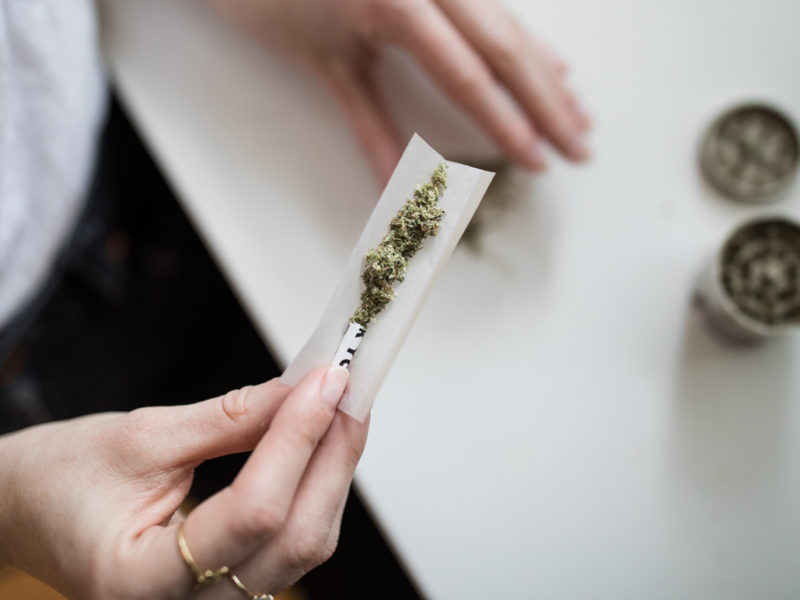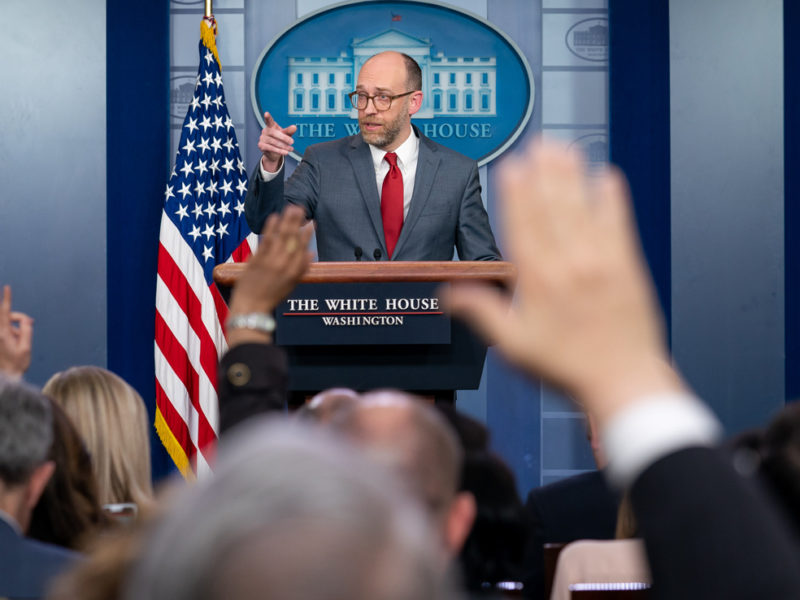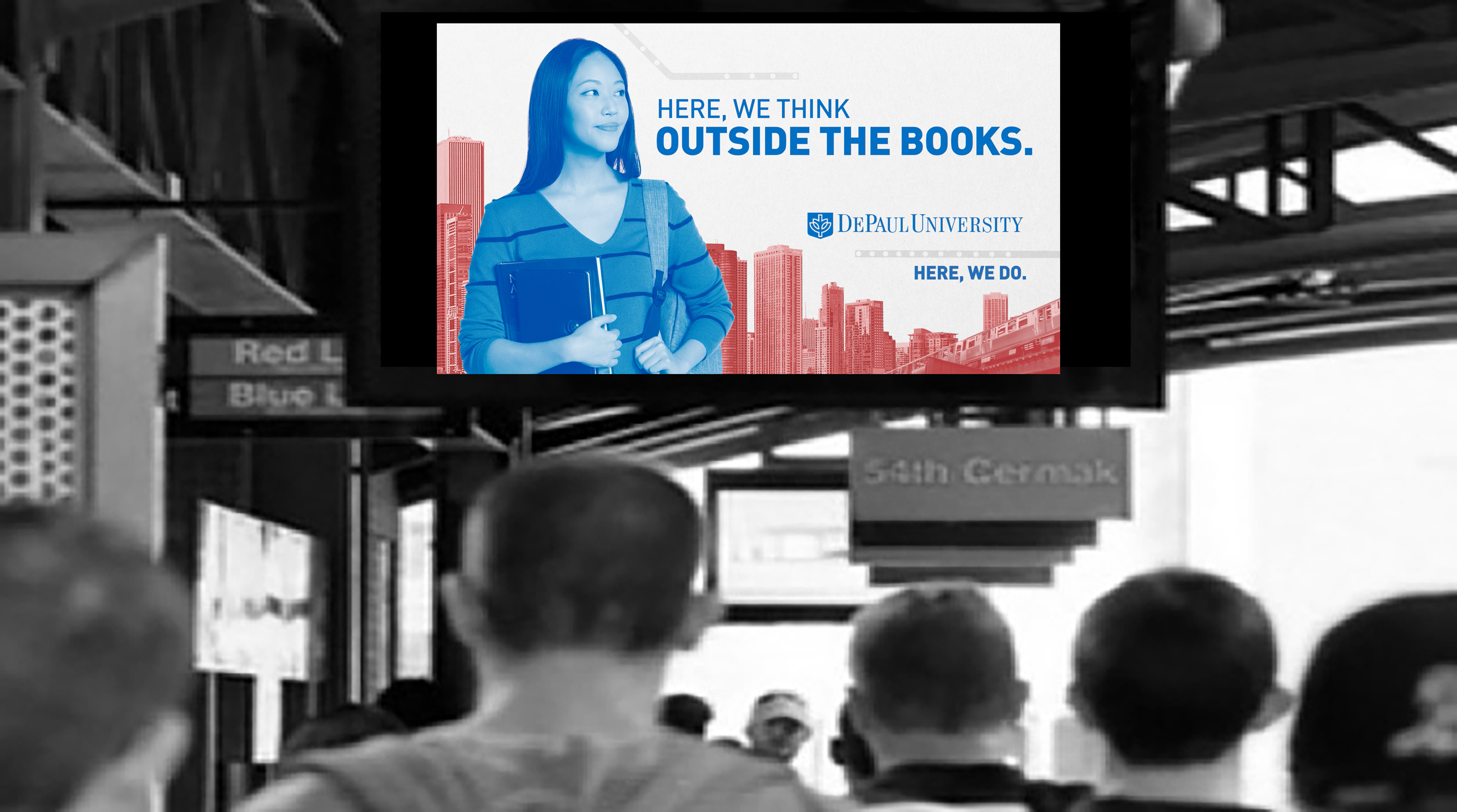
Here, We Do: DePaul Equips Students for the Age of Giving Back
Here, We Do. They’re three simple words, but to DePaul President Dr. A. Gabriel Esteban, they mean a lot. The sentence—which is at the heart of a new brand awareness campaign for the university (a Chicago Ideas partner)—succinctly gets to the core of the DePaul experience: a culture that prepares students to work, succeed and contribute in the community. “The here evokes our connection to Chicago and the role it plays in our students’ experience,” Esteban explains about the slogan. “The we plays upon the fact that we’re a very diverse, very inclusive community. And the do speaks to the hands-on experience of our education, which our students really value.”
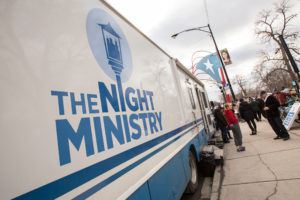
DePaul nursing students volunteer on the Night Ministry’s Health Outreach bus. (DePaul University / Jamie Moncrief)
That commitment to experiential education benefits students in every program, bridging theory and practice in ways that prepare them for their career and life aspirations. DePaul’s innovative partnership with Cinespace ensures students in the rapidly growing cinema program are fully engaged in all aspects of film making—in a professional studio here in Chicago. Anthropology students not only excavate ancient sites around the world, but they also engage in urban archeology throughout Chicago. And every year, thousands of students take advantage of DePaul’s vast network of internships because they value the active, applied learning and the career advantages they bring.
The Here, We Do. campaign celebrates not only DePaul’s commitment to hands-on learning, but also the countless opportunities students have to take their passion and put it into action, making a difference in their communities. Nursing student? Be a part of The Night Ministry’s mobile nursing station that travels to working class neighborhoods at night to help those who aren’t able to go to the doctor during the day. Concerned about violence in schools? Become a mentor to a high school student through DePaul’s Community Peacemakers program. Want to go to developing nations to help others? Join one of DePaul’s Service Immersion Trips and they’ll not only take you there, they’ll make sure you provide aid in a way that stresses “the dignity of each individual.”
DePaul infuses the spirit of community involvement and prepares students through experiential learning in every college and school. One initiative, the Neighborhood Legal Assistance Project (NLAP), brings DePaul College of Law students to a free homeless breakfast twice a month to provide legal assistance to the homeless population with needs including sealing and expunging their criminal records and obtaining state identification cards. Students in the Refugee and Forced Migration Studies Program work directly with refugees to help them learn English, adjust to high school, and to assist with paperwork. Even two students from the College of Computing and Digital Media found a big way to better their community. When the City of Chicago needed a quicker, more accurate way to inform the public about dangerous e.coli levels in Lake Michigan during summer swimming season, two master’s students combined their work to help create an app that uses predictive modeling based on rapid sample testing to let people know when swimming is likely unsafe. During the 2017 season, they tripled the City’s prior accuracy rate.
From the beginning of their time at DePaul, students also learn about the impact they can make by serving their communities through New Student Service Day and Vincentian Service Day, an annual tradition for the past 20 years. Combined, students, faculty and staff devote more than 100,000 hours of service each year. But the university’s commitment to caring goes beyond simply offering students opportunities to give back. The university actively works with students taking part in these opportunities to help them reflect on their experiences in a way that leads to personal, spiritual and professional growth—and helps them become effective, ethical leaders. This framework is directly inspired by the teachings of the university’s namesake, St. Vincent de Paul, who worked to help those in poverty-stricken and marginalized communities.
It’s no surprise, then, that so many DePaul graduates make service and giving back important parts of their lives and careers. When talking to alumni, Dr. Esteban says he never meets former DePaul students who tell him, “I’m here to become the next billionaire.” Instead, they tell him about the communities they’re involved in and their future plans for making them thrive. DePaul alumni include Chicago Ideas interfaith panelist Jenan Mohajir, Illinois Supreme Court Justice Anne Burke, Chicago Legal Clinic co-founder Edward Grossman, and recent MacArthur genius grant recipient Rami Nashashibi.
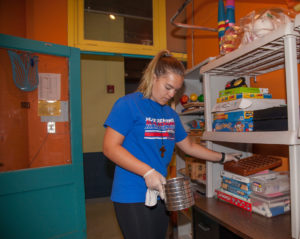
First-year student Samantha Schwartz helps to organize and clean art supplies at a local nonprofit as part of New Student Service Day (DePaul University / Maria Toscano)
Dr. Esteban believes that for many (if not most) alumni, service is a part of their experiential learning and an important part of who they are by the time they leave DePaul. In addition to having spent the last four years at an urban campus with a diverse student population, they’ve had access to various communities around Chicago through service opportunities. “It’s hard not to focus on those who are less fortunate when the whole time you’re at DePaul, you’re involved, and you get to know community groups,” Dr. Esteban says. “You see all this need that’s around you…And the question then becomes, what must be done? You start with what you can do, then say what else must you do, then you actually do it.”
Many DePaul alumni will be receiving a reminder of their action-oriented educational experience in the form of the Here, We Do. campaign, which can be seen all over Chicago at bus stops, in train stations, online, and on TV. (Up to 65–70 percent of students stay in the Chicagoland area when they graduate.) Dr. Esteban knows the Here, We Do. message resonates because of DePaul’s emphasis on taking action. “The push has always been to find ways to give back to our community. Even if you think you need help yourself, you still find ways to give back,” he says.


